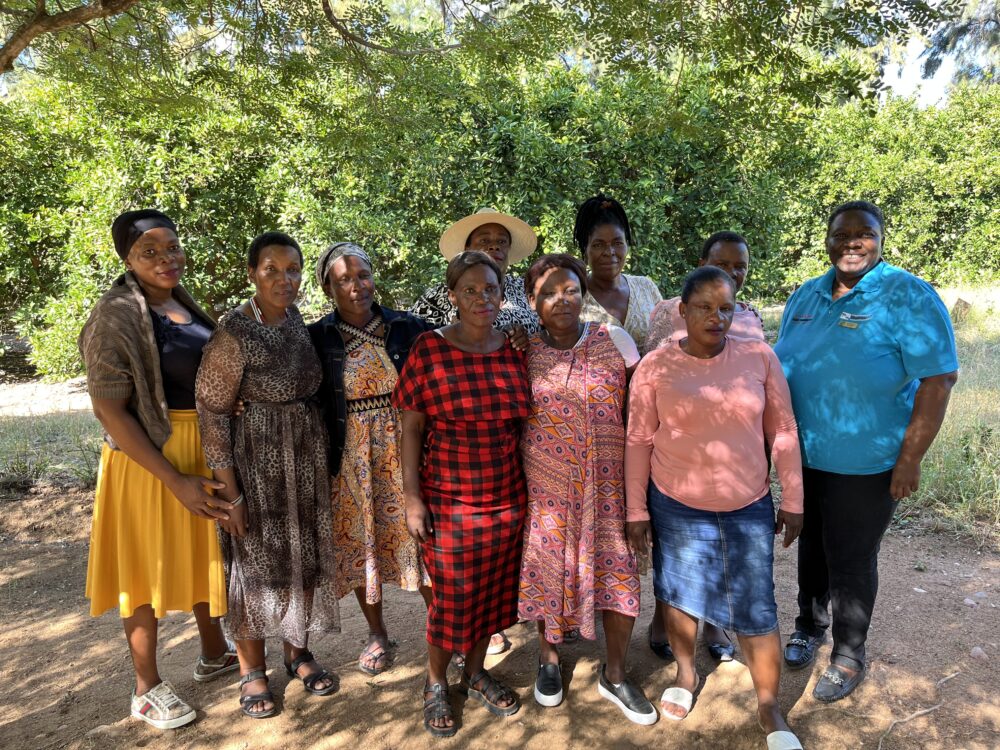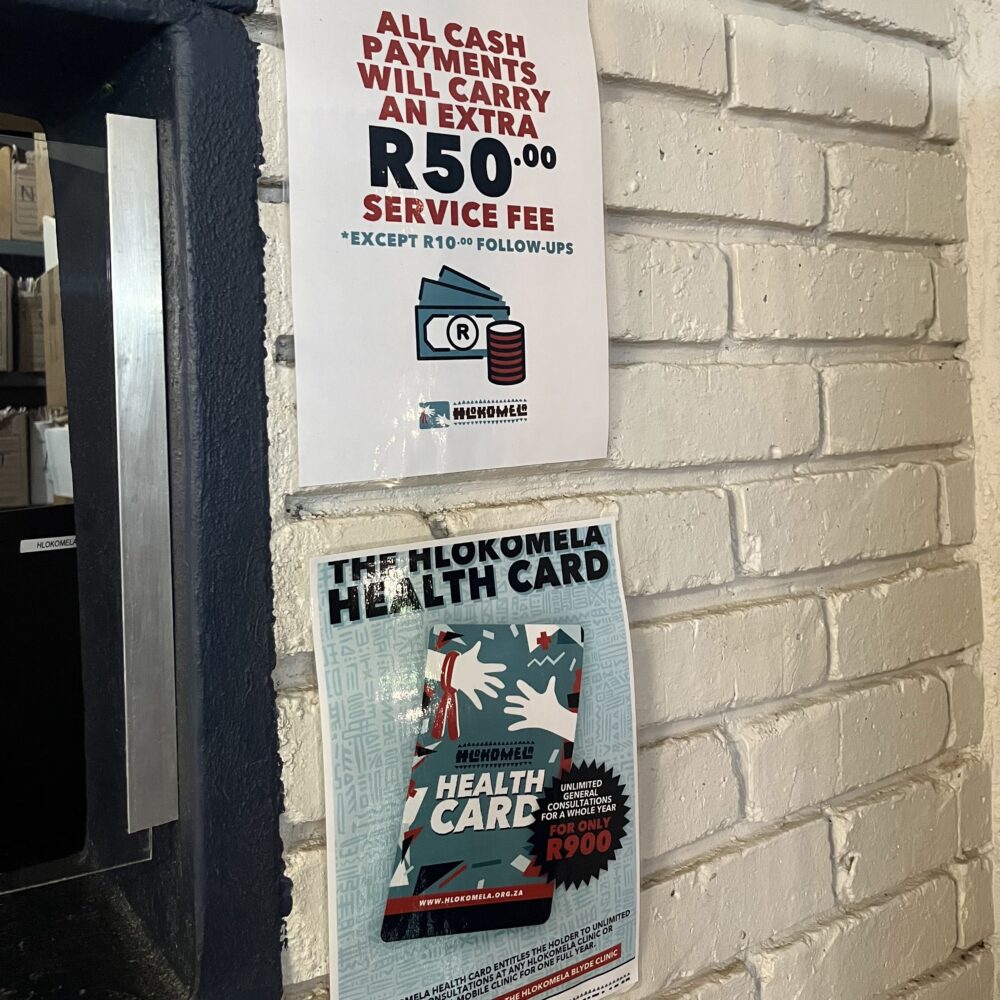Twenty years of hard lessons — with a dose of good luck and a lot of persistence — has helped Hlokomela Clinic to prepare for the US funding cuts crisis. (Zano Kunene)

When Sindy Nkuna woke up to an email saying that the US had decided to temporarily freeze all foreign aid in January, it was scary.
“I felt shattered,” she says. “For days I had racing heartbeats thinking what’s going to happen to me and to my kids. It was unbelievable. I have two boys.”
Nkuna had been placed at the Hlokomela Clinic, 200km away from Polokwane, keeping track of HIV information in the fruit and game farming community of the Mopani district, Limpopo.
A data capturer, she tracked new cases of HIV, how many people were tested and how many were on treatment. The funding for her job — and six HIV testing counsellors, a site coordinator and part of their financial manager’s salary — came through a grant from the Anova Health Institute, the HIV organisation which received the most President’s Emergency Plan for Aids (Pepfar) funding in South Africa.
Pepfar is the US government’s Aids fund that financially supports HIV projects, mostly run by non-profit organisations, in countries like South Africa.
Nkuna sat at home anxiously waiting to hear if she would still have a job. At the end of February, word came that almost all USAid funding, which included many of the Pepfar-sponsored projects, would be permanently ended.
Overnight Hlokomela was left without their HIV testing team, which does fieldwork, and funding for equipment like cooler bags and transport costs for mobile testing clinics, all of which were paid for by Anova. HIV field services at the 50 sites across Hoedspruit farms and communities that helped test around 1 000 people for HIV every month were shuttered.
“It affected all of our HIV outreach … it was worse than Covid,” says Christine du Preez, who founded Hlokomela in 2005.
The team had to figure out how to make it work for its remaining staff — and the 25 000 farmers, workers and their families that depend on them for basic health services.
But Hlokomela was far better equipped to deal with the crisis than many other organisations that also lost their USAid funding. Here’s why the plans they’ve made — and the lessons they learned in the past decade — are helping them get by.
Use what you’ve got
Problem: Hlokomela lost its field HIV testing team
Solution: Community health workers get people to test at Hlokomela’s clinic (facility staff weren’t affected by funding cuts) and staff from other projects help with testing.
Hlokomela has three clinics, with nine mobile clinics that work in 72 sites across fruit and game farms. With 106 staff members, it employs paid nurses, data capturers, lay counsellors, community health workers and doctors who volunteer twice a week for free.
The Anova funding — which made up 2% of Hlokomela’s overall budget — paid for the mobile testing clinics and the staff who ran them.
In 2008, 28.5% of farmworkers in Hoedspruit had HIV, over 10 percentage points higher than the proportion of adults — 17.64% — who had the virus in South Africa in 2007, according to health department data.
Du Preez says their latest data from this year shows that Hlokomela has helped the proportion of HIV-infected farmworkers to drop to 6.5%.
But when their funding stopped, Hlokomela was caught by surprise. Since then, testing has dropped by nearly 90%, Nkuna says.
Still, they made a plan.
It’s the community health workers — known as nompilos, “mother of life” in isiZulu — they’ve leaned into.
Hlokomela has trained about 75 of these farmworkers, who earn a monthly stipend, in health education as well as checking blood pressure and heart rates, and screening for chronic conditions such as HIV and TB.
 THE NOMPILOS: Nine of Hlokomela’s nompilos and programme manager Antoinette Ngwenya outside Hlokomela Clinic. (Zano Kunene)
THE NOMPILOS: Nine of Hlokomela’s nompilos and programme manager Antoinette Ngwenya outside Hlokomela Clinic. (Zano Kunene)
Because Hlokomela’s funding for clinic staff was still intact, they could continue to test people for HIV at facilities. But someone had to tell people about it — and explain how to get there.
The nompilos went around farms identifying people who needed to get tested and encouraged them to go to Hlokomela’s clinics.
Hlokomela then also roped in seven volunteers, who were certified in HIV testing, from another of their projects to help with the now higher numbers of people who needed to get tested at their clinics.
Moreover, the project came up with a short-term fix to stop the backlog to capture testing data from getting too high.
Nkuna was the only person trained to use the government’s HIV database.
That’s why Hlokomela temporarily transferred two employees from its sex worker programme to help with recording health tracking data, says Antoinette Ngwenya, a Hlokomela programme manager.
“The fact that we still have a clinic means that we can still do HIV testing. Because if we don’t test, and get them on treatment, we could have a boom of HIV again,” says Du Preez.
“Hopefully we will get another plan. It looks like the Discovery Fund is also going to help us to get the HTS [HIV testing services] going again.”
Don’t put all your eggs in one basket
Problem: Getting all your money from one donor can make you close down overnight
Solution: Diversify funding as far as possible — and as soon as possible.
About a decade ago, Hlokomela learned a tough lesson: don’t rely on a single donor; it poses a serious risk of an organisation collapsing when things go wrong with the funder.
For 10 years, Hlokomela was mainly funded by the UN International Organisation for Migration (IOM).
“When we had IOM we could run many projects and have big events for campaigns. It was great,” says Ngwenya.
But then IOM’s funding to Hlokomela ended in 2016 and the organisation had to start raising other funds.
“We were worried we were going to close down. One of the challenges was realising there was funder fatigue, so we had to start thinking outside of the box,” Du Preez says.
“We found ways to make our own money, got our network of donors to help us find other funders and made an agreement with the provincial health department.”
The Limpopo health department signed a three-year agreement to pay stipends for Hlokomela’s then 41 nompilos.
Eight years later, Hlokomela is funded by grants from organisations like the Discovery Fund, the Aids Foundation South Africa via the Global Fund, the pharmaceutical company Adcock Ingram, and the Australian High Commission. They also get donations from individuals, businesses and lodges in the area. The provincial health department, meanwhile, supplies medication, including HIV treatments.
Hlokomela also just registered as an NGO in the US, which Du Preez believes will make it easier to get US funding from philanthropic foundations based there. She’s been working on the registration for 15 months.
“One day we spoke with our managers and I said we need to get money from America. We started with the application for an NGO in America called the Hlokomela Fund. I just got back from there to finalise it.”
Right now, though, there are rumours that the Trump administration may impose restrictions on money flowing from US-based philanthropic foundations to projects with sites in countries outside the US. Such restrictions could potentially influence how US-registered organisations are allowed to operate.
Share the cost
Problem: Not enough funds for health services offered
Solution: Employers co-pay for employees’ clinic visits and Hlokomela sells fresh produce to stores for extra income.
In 2016, Hlokomela decided to find new ways to help fund the health services they offered to farmworkers.
Before that, all health services were free because they were funded by grants and other donations.
But grants and donations can end at any time, so having such services fully funded in this way means they too can stop at any time. Some form of co-payment was needed, Hlokomela’s managers argued that subsidised services are more sustainable than services which are 100% paid for by donors.
First, Hlokomela had to work out how much clinic visits cost.
Consultants brought in by Discovery helped calculate the average cost per clinic visit for patients, which came to R400.
In 2021, Hlokomela introduced a three-tier co-payment system. Employers, like farmers and reserve owners, could subscribe for between R1 650 and R3 850 per month, based on their staff size. For example, those with up to 50 employees pay R1 650. If a worker went to the clinic for a consultation, they only paid 30% of the consultation fee, the rest was covered by the employer’s contribution.
That system is still in place.
 UNLIMITED CONSULTATIONS: An educational poster of Hlokomela’s health club card, which gives subscribers unlimited visits to a doctor or nurse at the clinic for a year. (Zano Kunene)
UNLIMITED CONSULTATIONS: An educational poster of Hlokomela’s health club card, which gives subscribers unlimited visits to a doctor or nurse at the clinic for a year. (Zano Kunene)
Du Preez says some of the farmers weren’t enthusiastic about the costs but soon saw the benefits. If they had to take their workers to a government clinic, which was further away, long queues meant they’d have to wait at the clinic all day. But longtime, good relationships with the farmers helped.
People from the area also can buy a monthly health card or pay for walk-in visits for R300.
By the end of 2023, Hlokomela had around 16 employers with 2 000 employees subscribed and sold 554 health cards. This new revenue stream brought in around R2 million last year alone, according to Du Preez.
Hlokomela also sells vegetables and fruit from their garden to retailers such as Pick n Pay as well as local lodges. As of February 2025, the partial-payment system made up around 11% of their budget and the garden 2%.
Global Fund support for their sex worker programme — which included money for HIV services — ended in April, but they’ve secured a six-month extension, albeit with half of the original budget. They’ll have to make it stretch. Further funding from the Global Fund, which receives one-third of its funding from the US, could be under threat with the Trump administration’s targeted slash-and-burn approach.
Du Preez says that, just as they got through the Covid pandemic without having to let any staff go, they plan to do the same in this crisis.
“We’ve been doing it [outreach HIV testing] for the last 20 years and can’t stop now … There’s always a plan B. Don’t ask me what it is now but we’ll have one. We always try to have something else.”
Zano Kunene visited the Hlokomela clinic as part of a Discovery Foundation media tour in April. The foundation covered the costs of the tour but did not see or approve this story before publication. They also didn’t have input in the content of this story.
This story was produced by the Bhekisisa Centre for Health Journalism. Sign up for the newsletter.
